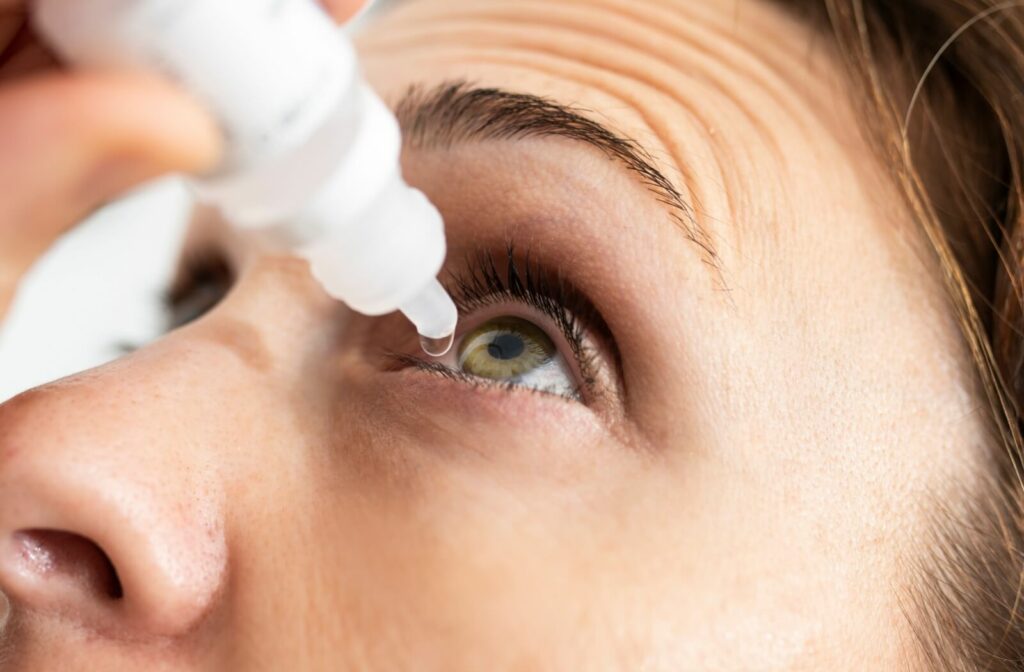Many of us know the discomfort of dry eyes: the persistent stinging, the constant need to blink, and the nagging feeling that something’s just not quite right. These symptoms can often sneak their way into our daily lives, leaving us tired and frustrated.
One symptom some people overlook is blurry vision. Dry eyes can make your vision blurry because a lack of moisture on the eye’s surface can cause unclear images to be sent to your brain. However, since many eye conditions can cause blurry vision, you may need your optometrist to help you pinpoint the issue with an eye exam.
What Is Dry Eye?
Dry eye occurs when your eyes don’t produce enough tears or when the tears evaporate too quickly. For some, this isn’t just a minor annoyance; it can blur everything around us, making even simple tasks a real challenge. Here are some factors that might be behind your dry eyes:
- Age: As we age, our eyes naturally cut back on tear production.
- Gender: Hormonal changes, especially in women during pregnancy, menopause, or while using oral contraceptives, can lead to dry eyes.
- Medications: Some medications like antihistamines, decongestants, blood pressure meds, and antidepressants can leave your eyes high and dry.
- Medical Conditions: Conditions like rheumatoid arthritis, diabetes, and thyroid disorders can mess with your tear game.
- Environmental Factors: Wind, smoke, or dry climates can turn your eyes into mini deserts.
- Screen Time: Staring at screens without blinking can dry your eyes out like the Sahara.
Your eyes need a constant layer of tears, known as the tear film, to stay moist and comfortable. The tear film has 3 layers:
- The oil layer: Prevents evaporation.
- The watery layer: Provides moisture.
- The mucus layer: Helps spread the tears evenly over the surface of the eye.
When any of these layers are disrupted, dry eye, discomfort, & vision problems may arise.
How Dry Eye Leads to Blurry Vision
Dry eye can blur your vision, either occasionally or constantly. Without enough lubrication, your tear film breaks down quickly, leaving your eyes’ surface uneven. This unevenness scatters light, resulting in blurry vision. In addition, dry eye irritation and inflammation can make visual disturbances worse.
Neglecting dry eye can seriously affect your eye health. Tears help clear away dirt and dust from your eyes. If debris builds up, it can mess with your vision or even harm your cornea, upping the risk of eye infections.
Surprisingly, dry eyes can make your eyes water! As your eyes get irritated, they produce more tears. These tears, however, don’t stick around long enough to soothe the irritation, but do refract light, much like peering into the surface of a pool. This is another source of blurry vision.
Diagnosing Dry Eye & Blurry Vision
Dry eye isn’t the only cause of blurry vision, and knowing what eye condition to treat is the first step. An eye exam is crucial for identifying the relationship between dry eye and blurry vision—and typically the sooner your optometrist can identify it, the better. Waiting can often make things worse and might even damage your eye’s surface permanently. If dry eye isn’t treated in time, it could turn into a chronic problem, causing long-term vision issues.
By examining your eyes thoroughly, an optometrist can determine the severity of your dry eye, assess any damage to your cornea, and recommend appropriate treatments to improve your vision and comfort.
To diagnose dry eye and its impact on your vision, your optometrist may perform several tests:
- Schirmer test: Measures tear production using pieces of paper.
- Tear breakup time (TBUT): Assesses tear film stability using a small amount of dye and observing when it evaporates.
- Meibomian gland evaluation: Checks for blockages in the oil-producing glands with a slit-lamp.

At-Home Treatments for Dry Eye
You may be able to treat mild dry eye with several non-invasive, at-home treatments to manage symptoms. These include:
- Artificial tears: These lubricating eye drops can be purchased over the counter or through our practice. They mimic natural tears and provide immediate moisture and comfort.
- Warm compresses: Applying warm compresses can help loosen blocked oil in your meibomian glands, improving the quality of your tears. You can make your own or buy reusable ones at our clinic.
- Humidifiers: Using a humidifier in your home or office can add moisture to the air, especially in dry climates or during winter months.
- Blinking exercises: Remember to take breaks from screens and practice blinking exercises to help refresh your tear film.
- Prescription eye drops: If symptoms persist, your eye doctor may recommend prescription eye drops, such as Regener-Eyes, designed to increase tear production and provide prolonged relief.
- Omega-3 supplements: Some studies suggest that omega-3 fatty acids may help improve tear quality. We offer omega-3 supplements at our practice.
- Specialty cleansers: We can recommend lid scrubs or face washes specifically formulated for dry eye relief. These gentle cleansers help remove debris and allergens that can exacerbate symptoms.
In-Office Treatments for Dry Eye
For more severe or persistent dry eye, your optometrist can help with personalized therapies suited for your symptoms. At Pack Optical, we use:
- Intense pulsed light (IPL) therapy: This treatment uses precise light pulses to melt away blockages in the meibomian gland, improving tear health.
- Lid expression: Your optometrist can manually massage your eyelids to unclog oil glands. This is typically done after another therapy to loosen the blockages.
- Radiofrequency (RF) Therapy: This non-invasive treatment uses radiofrequency energy to stimulate the meibomian glands in the eyelids, enhancing oil production and improving tear quality.
Lifestyle Changes to Manage Dry Eye
Rather than letting dry eyes ruin your day, be proactive! Making simple lifestyle changes can help prevent dry eye. Here are our suggestions:
- Stay hydrated: Drink plenty of water to keep your body and eyes hydrated.
- Take breaks: Follow the 20-20-20 rule—every 20 minutes, look at something 20 feet away for 20 seconds.
- Wear sunglasses: Protect your eyes from wind and sun exposure with stylish sunglasses.
- Adjust your diet: Include eye-healthy nutrients, such as omega-3 fatty acids, in your diet to support tear production.
See Comfortably Again with Professional Help
If you’re struggling with dry eye and blurry vision, don’t wait—get in touch with Pack Optical today! Our team can provide personalized dry eye therapy tailored to your needs, helping you achieve clear and comfortable vision once again. And if you’re unsure if dry eyes are behind your blurriness, take our dry eye quiz.
Book your appointment today to start your journey towards better eye health!



